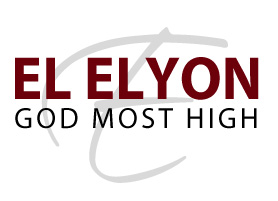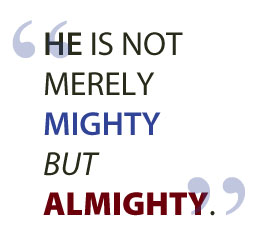 I’m often asked why I use the term “Elyon” in reference to God in my novels. Though I am comfortable making up names for men and angels for the purposes of fiction, I would not presume to make up a name for God. That’s why I chose a name that, while unfamiliar to many people, is specifically revealed in Scripture.
I’m often asked why I use the term “Elyon” in reference to God in my novels. Though I am comfortable making up names for men and angels for the purposes of fiction, I would not presume to make up a name for God. That’s why I chose a name that, while unfamiliar to many people, is specifically revealed in Scripture.
The Hebrew “Elyon” occurs thirty-one times in the Old Testament. The equivalent Aramaic word (“Hilay”) occurs ten times, all in the book of Daniel.
Elyon is always translated “Most High.” When preceded by “El,” the Hebrew word for God, it is translated “God Most High.” In the New Testament the Greek equivalent to Most High is used nine times.
 The name or title “Elyon” emphasizes God’s uniqueness and his supremacy above all others. It reminds us he is the Creator of heaven and earth and the Owner of all. He is not merely mighty, but Almighty. He is the Sovereign Possessor and Controller of all things. Elyon sovereignly delivers his children and sovereignly accomplishes his purpose even in their suffering, which itself is temporary and will be followed by the eternal refreshment he promises to bestow on them.
The name or title “Elyon” emphasizes God’s uniqueness and his supremacy above all others. It reminds us he is the Creator of heaven and earth and the Owner of all. He is not merely mighty, but Almighty. He is the Sovereign Possessor and Controller of all things. Elyon sovereignly delivers his children and sovereignly accomplishes his purpose even in their suffering, which itself is temporary and will be followed by the eternal refreshment he promises to bestow on them.
Elyon empowers his children through drawing on his own omnipotence, which makes all creature claims to power (whether by fallen angels or by man) utterly presumptuous and laughable.
An understanding of the nuances and meaning of “Elyon” can best be gained by studying it in the context of Scripture. What follows are most of the passages in which the word “Elyon” is used.
El Elyon: God Most High (Key Scripture Passages)
Then Melchizedek king of Salem brought out bread and wine. He was priest of God Most High, and he blessed Abram, saying, “Blessed be Abram by God Most High, Creator of heaven and earth. And blessed be God Most High, who delivered your enemies into your hand.” Then Abram gave him a tenth of everything (Genesis 14:18-20).
The LORD thundered from heaven; the voice of the Most High resounded (2 Sam. 22:14; Psalm 18:13).
I will give thanks to the LORD because of his righteousness and will sing praise to the name of the LORD Most High (Psalm 7:17).
For the king trusts in the LORD; through the unfailing love of the Most High he will not be shaken (Psalm 21:7).
There is a river whose streams make glad the city of God, the holy place where the Most High dwells (Psalm 46:4).
How awesome is the LORD Most High, the great King over all the earth! (Psalm 47:2)
Sacrifice thank offerings to God, fulfill your vows to the Most High (Psalm 50:14).
I cry out to God Most High, to God, who fulfills his purpose for me (Psalm 57:2).
I envied the arrogant when I saw the prosperity of the wicked…Pride is their necklace; they clothe themselves with violence; From their callous hearts comes iniquity; the evil conceits of their minds knows no limits. They scoff, and speak with malice; in their arrogance they threatened oppression…They say, “How can God know? Does the Most High have knowledge?” …When I tried to understand all this, it was oppressive to me till I entered the sanctuary of God; then I understood their final destiny (Psalm 73:3, 6-11, 16).
They remembered that God was their Rock, that God Most High was their Redeemer (Psalm 78:35).
But they put God to the test and rebelled against the Most High; they did not keep his statutes (Psalm 78:56).
Let them know that you, whose name is the LORD, that you alone are the Most High over all the earth (Psalm 83:18).
He who dwells in the shelter of the Most High will rest in the shadow of the Almighty (Psalm 91:1).
If you make the Most High your dwelling, even the LORD, who is my refuge, then no harm will befall you, no disaster will come near your tent. For he will command his angels concerning you to guard you in all your ways; they will lift you up in their hands, so that you will not strike your foot against a stone (Psalm 91:9-12).
It is good to praise the LORD and make music to your name, O Most High (Psalm 92:1).
You, O LORD, are the Most High over all the earth; you are exalted far above all gods (Psalm 97:9).
They rebelled against the words of God and despised the counsel of the Most High (Ps. 107:11).
“I will ascend to heaven; I will raise my throne above the stars of God; I will sit enthroned on the mount of assembly, on the utmost heights of the sacred mountain. I will ascend above the tops of the clouds; I will make myself like the Most High” (Isaiah 14:13-14).
Is it not from the mouth of the Most High that both calamities and good things come? (Lam. 3:38)
Nebuchadnezzar then approached the opening of the blazing furnace and shouted, “Shadrach, Meshach and Abednego, servants of the Most High God, come out! Come here!” So Shadrach, Meshach and Abednego came out of the fire (Daniel 3:26).
“You will be driven away from people and will live with the wild animals; you will eat grass like cattle. Seven times will pass by for you until you acknowledge that the Most High is sovereign over the kingdoms of men and gives them to anyone he wishes” (Daniel 4:32).
“O king, the Most High God gave your father Nebuchadnezzar sovereignty and greatness and glory and splendor. (Daniel 5:18)
“But the saints of the Most High will receive the kingdom and will possess it forever; yes, for ever and ever” (Daniel 7:18).
Until the Ancient of Days came and pronounced judgment in favor of the saints of the Most High, and the time came when they possessed the kingdom (Daniel 7:22).
He will speak against the Most High and oppress his saints and try to change the set times and the laws. The saints will be handed over to him for a time, times and half a time (Daniel 7:25).
Then the sovereignty, power and greatness of the kingdoms under the whole heaven will be handed over to the saints, the people of the Most High. His kingdom will be an everlasting kingdom, and all rulers will worship and obey him (Daniel 7:27).
He will be great and will be called the Son of the Most High. The Lord God will give him the throne of his father David (Luke 1:32).
The angel answered, “The Holy Spirit will come upon you, and the power of the Most High will overshadow you. So the holy one to be born will be called the Son of God (Luke 1:35).
And you, my child, will be called a prophet of the Most High; for you will go on before the Lord to prepare the way for him (Luke 1:76).
He shouted at the top of his voice, “What do you want with me, Jesus, Son of the Most High God? Swear to God you won’t torture me!” (Mark 5:7)
Some have asked why I picked El Elyon over Elohim, Jehovah, or the other names for God used in Scripture. Elyon is more of a name than Elohim, which is the general word for God. I considered using Yahweh. But the use of the word is offensive to some from a Jewish background (where the proper name for God is not used, for fear of taking His name in vain). Adonai and many others were options, but I just like the sound and meaning of Elyon. :)
Photo by Antonio Grosz on Unsplash





